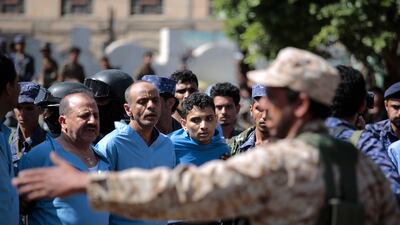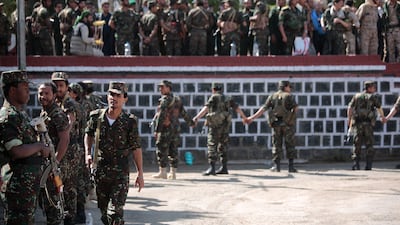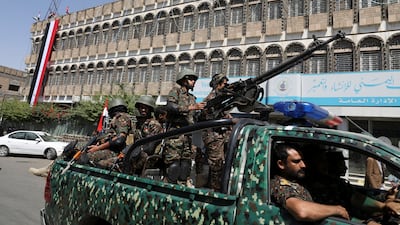A photograph taken minutes before nine men were publicly executed by Houthi rebels in Sanaa clearly shows one of the victims, who appears to be a teenager, unable to stand, allegedly due to torture.
Iran-backed Houthis carried out the public executions by firing squad in Al Tahrir Square on Saturday. One of the men was a teenager at the time of his abduction, human rights groups told The National.
The militia says the men were involved in the killing of one of their senior commanders, Saleh Al Samad, who died in an air strike carried out by Saudi Arabian jets while visiting the port of Hodeidah in April 2018.
"Despite repeated calls by our ministry and human rights organisations, we were shocked by the implementation of the wrongful Houthi ruling against innocent people, after they disappeared for three years in Houthi detention," Ahmed Arman, Yemen’s Minister of Human Rights and Legal Affairs told The National.
"The civilians were wrongfully executed following a fake trial, by an unlawful court controlled by the Houthi rebels themselves."
He said this could invalidate the Stockholm Agreement which called for the release of all detainees in a series of prisoner exchanges, some of which were completed successfully, notably in October 2020 when 1,000 prisoners were freed.
"We urgently call upon the international community, the UN Security Council and human rights organisations to immediately stop mass executions carried out by the rebels against Yemeni journalists, politicians and other innocent civilians" the minister said.
Amat Al Salam Al Haj, director of the Abductees’ Mothers Association, told The National the Houthi rebels executed the defendants three years after they were reported missing, having been abducted and held incommunicado.
"They disappeared them for three years, preventing their families from visiting them and deprived them of their legal rights," Ms Al Haj said.
"The victims told the court that the Houthi interrogators used all types of torture tactics to snatch confessions from them, they electrocuted them, deprived them of sleep for days and hung them from the dungeons' ceilings upside down," she said.
Public execution after ordeal
Crowds of Houthi supporters attended the execution on Saturday.
One of those killed, Abdulaziz Al Aswad, was a teenager at the time of his abduction, his relatives said, and the Houthi court refused to allow a medical examiner to check his age.
"He was 18 years old when they abducted him three years ago," one of his relatives told The National.
They said Al Aswad knew nothing about the death of Al Samad.
"He is a child who worked as a fisherman, his only fault was that he was in the street where the Houthi leader was killed in 2018," the relative said.
In photos taken minutes before his death, Al Aswad appears terrified. Unable to stand, he is being held up by a Houthi soldier, having suffered a severe back injury caused by brutal torture in Houthi detention, his relative said.
The mass killing sparked widespread anger among the Yemeni public. Activists on social media circulated pictures and video footage of the victims being executed, calling for the Houthi rebels to be held accountable and referred to the International Criminal Court.






